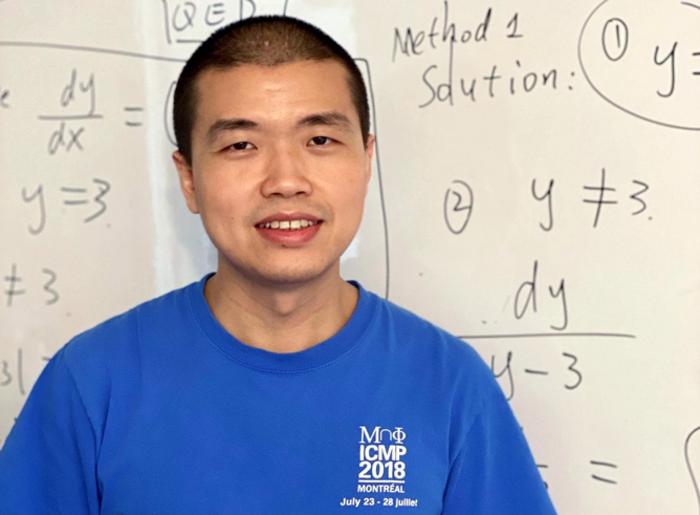Dr. Wencai Liu, an associate professor of mathematics at Texas A&M University, has been selected to receive the 2024 International Union of Pure and Applied Physics (IUPAP) Early Career Scientist Prize in Mathematical Physics in recognition of his exceptional achievements and future potential in mathematical physics.

Credit: Courtesy of Dr. Wencai Liu
Dr. Wencai Liu, an associate professor of mathematics at Texas A&M University, has been selected to receive the 2024 International Union of Pure and Applied Physics (IUPAP) Early Career Scientist Prize in Mathematical Physics in recognition of his exceptional achievements and future potential in mathematical physics.
Liu is one of three scientists worldwide honored with the prize, one of 19 celebrating the contributions of early career physicists within the subfields of each commission comprising the IUPAP, which was founded in 1976 to promote research in mathematical physics. Each prize consists of a certificate, medal and a monetary award.
Liu joined the Texas A&M Department of Mathematics faculty in 2019 after earning his Ph.D. in 2015 from Fudan University in China and completing a postdoctoral fellowship at the University of California, Irvine, under the mentorship of Dr. Svetlana Jitomirskaya. He is internationally respected for his expertise in mathematical physics and substantial contributions to the study of quasi-periodic and periodic Schrodinger operators.
Once every three years, up to three early career scientists earn the coveted prize, presented by the IUPAP in conjunction with the International Congress on Mathematical Physics (ICMP), which is organized by the IUPAP once every three years. Liu received his award during the opening ceremony of the 21st ICMP, held July 1-6 in Strasbourg, France. Earlier this year, he also was honored as one of 50 Simons Foundation Fellows across the U.S. and Canada.
“This IUPAP Early Career Scientist Prize is Wencai’s third major award during the last year,” said Dr. Peter Howard, professor and head of Texas A&M Mathematics. “Judging by the trajectory of his research program, I expect that there will be many more in the years ahead.”
Liu’s research at Texas A&M primarily focuses on the dynamics of linear and nonlinear Schrodinger equations, which are fundamental to quantum mechanics and have significantly contributed to our understanding of various phenomena in solid-state physics and condensed matter physics, among other avenues with multidisciplinary impact and application. Such equations and related breakthroughs hold the potential to revolutionize areas from quantum computing and quantum communication to the development of new semiconductor materials.
The IUPAP cited Liu for collaborative contributions to the study of quasi-periodic operators — particularly in areas involving sharp spectral transitions and the hierarchical structure of eigenfunctions — and advancements in the spectral theory of periodic Schrodinger operators utilizing a broad spectrum of mathematical tools. To date, his research has resolved numerous challenging problems, including the irreducibility of Fermi and Bloch varieties as well as the proof of geometric Borg’s theorem in arbitrary dimensions.
Prior to his Early Career Scientist Prize and Simons Fellowship, Liu was honored along with Jitomirskaya with a 2023 Frontiers of Science Award at the inaugural International Congress of Basic Science in Beijing. In addition, he was an invited speaker at the 2021 International Congress of Mathematical Physics in Geneva.
Beyond excelling in research, Liu is also deeply committed to outreach activities, including his work as co-founder of the department’s Program for Research in Mathematics (PReMa) and a co-organizer for the Texas A&M Math Circle.
By Shana K. Hutchins, Texas A&M University College of Arts and Sciences
###




